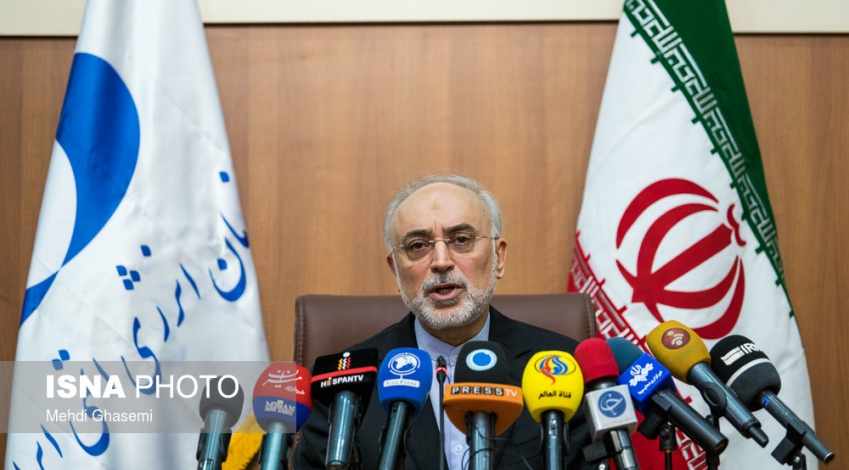Thursday 7 June 2018 - 12:43
Story Code : 307748
Iran begins working on infrastructure to build advanced centrifuges
�Yesterday, we took the first step and submitted a letter to the International Atomic Energy Agency (IAEA) on the start of certain activities, but we started to take the necessary practical measures today,� Ali Akbar Salehi, the AEOI chief, told a press conference in Tehran on Tuesday.
�If conditions are ripe, I may explain tomorrow night at Natanz one of the projects we have in mind, which is�a center for the production of new centrifuges,� he added.
He made the announcements less than a day after Leader of the Islamic Revolution Ayatollah Seyyed Ali Khamenei urged preparations for a potential collapse of the Iran deal, officially called the Joint Comprehensive Plan of Action (JCPOA) following the US�s withdrawal.
The Leader ordered the AEOI to get prepared for a rise to 190,000 SWUs (separative work unit) within the framework of the deal.
Salehi further said that the developing of such infrastructure would move along quickly, adding, �If we were progressing normally, it would have taken six or seven years, but this will now be ready within weeks and months.�
According to Salehi, Tehran has also increased the capacity to generate electricity at the Natanz facility.
The senior nuclear official gave assurances that none of the measures Tehran is taking will violate the terms of the JCPOA.
Late on Monday, the AEOI said it is starting a process to accelerate the preparation of infrastructure for the manufacturing of centrifuge rotors and boosting the domestic capacity for the production of UF4 and UF6 gases.
Behrouz Kamalvandi, the spokesman for the Atomic Energy Organization of Iran (AEOI), told ISNA news agency that Iran will inform the IAEA of the start of the process to�increase the production capacity of uranium hexafluoride (UF6), a chemical compound which serves as feedstock for centrifuges.
�In a letter that would be delivered to the International Atomic Energy Agency by the Iranian mission in Vienna, it has been announced that we will begin the process of increasing the capacity for the production of UF6 and UF4 gases on Monday as well as the construction of factories for the manufacturing of centrifuge rotors,� Kamalvandi said.
SWU is the standard measure of the effort required to separate isotopes of uranium during an enrichment process. 1SWU�is equivalent to 1 kilogram of�separative work.
Under the Joint Comprehensive Plan of Action (JCPOA), Kamalvandi said, Iran was supposed to achieve a capacity of�at least 190,000 SWUs by the end of the 15th year since the deal's enforcement in January 2016.
�We had earlier estimated that we could reach about 250,000-SWU capacity by the end of the 15th year, but given the Leader�s call for us to pursue a 190,000-SWU capacity, we need to take measures to accelerate this process,� the official added.
Achieving that capacity�means increasing efforts to set�up workshops and factories and providing the infrastructure necessary for moving forward at a high speed, he added.
On May 8, US President Donald Trump announced Washington's pullout from the nuclear deal, vowing to reinstate nuclear sanctions on Iran and impose �the highest level� of economic bans on the Islamic Republic.
He also said Iran was in �pursuit of nuclear weapons,� a claim that contradicts numerous reports by the UN nuclear watchdog confirming the peaceful nature of Iran�s nuclear work and the country�s full compliance with the accord.
US Secretary of State Mike Pompeo later threatened Iran with the �strongest sanctions in history� if it did�not comply with a list of steep demands, including ending uranium enrichment.
Iran has said it will remain committed to the deal for the time being, pending negotiations with other signatories to the JCPOA to see if Iran�s interests would still be protected under an accord without the US.
Tehran�s other partners in the deal � Germany, France, Britain, Russia and China � have all condemned Washington�s unilateral withdrawal and said they would still live up to their commitments as part of the deal.
In his speech on Monday, Ayatollah Khamenei said the European governments should not expect the Iranian nation �to both put up with sanctions and give up its nuclear activities and continue to observe limitations.�
Elsewhere in his remarks, Kamlavandi reiterated that achieving nuclear weapons is contrary to Iran�s religious doctrine.
�Our message is that we will maintain our capacity for activation at a high level. We only agreed to limit [our nuclear program] because for the deal to take effect, both sides had to remain committed to their obligations,� he noted.
# Tags











